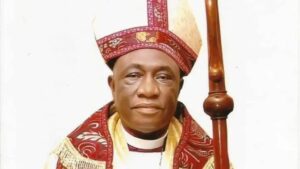

The Archbishop of the Ecclesiastical Province of Kwara, Church of Nigeria (Anglican Communion), Most Reverend Israel Afolabi Amoo, has decried the worsening state of the nation, describing Nigeria as a country “hanging by the mercy of God” amid economic collapse, insecurity, and leadership failure.
 Speaking at the 26th Provincial Council Meeting of the Church held at the Diocese of Offa in Kwara State, Archbishop Amoo lamented that Nigeria’s condition has deteriorated to the point where “every index of a sustainable nation has disintegrated”.
Speaking at the 26th Provincial Council Meeting of the Church held at the Diocese of Offa in Kwara State, Archbishop Amoo lamented that Nigeria’s condition has deteriorated to the point where “every index of a sustainable nation has disintegrated”.
He said the country has been overwhelmed by insecurity, economic mismanagement, and political instability, leaving millions of citizens in despair. “Our nation is currently navigating multifaceted challenges marked by insecurity, economic hardship, and political tension,” the Archbishop said. “Banditry, terrorism, kidnapping, and insurgency have made life unbearable for many, while conflicts between farmers and herders continue to destroy communities and livelihoods.”
The cleric faulted what he described as the government’s lack of seriousness in addressing the hardship faced by Nigerians, condemning the abrupt removal of fuel subsidy without adequate economic cushioning, which he called “a direct hit on the average Nigerian”.
He said: “Since the first day of this government, it has been woes upon woes. Promises were made that were never meant to be fulfilled. Inflation is rising, unemployment is increasing, and citizens can no longer meet their basic needs. The collapse of our exchange rate and poor implementation of government policies have pushed the nation to a more sorry state.”
Archbishop Amoo also criticised the Legislature and Judiciary, saying their compromise has worsened public trust in governance. “The judiciary is no longer the hope of the common man,” he said. “The conduct of the last general elections and tribunal proceedings exposed the decay within our system. It has been bad before, but now the situation is both hopeless and unbearable.”
He decried the recycling of political leaders, which, according to him, has shut out young people from governance. “Our youths no longer believe they are the leaders of tomorrow,” he noted. “What we see are the same old faces with new titles and political names, while the same problems persist.”
The Archbishop described the Nigerian economy as “virtually lifeless, stressing that “education is at its lowest point, industries are shutting down, and the country now imports almost everything.” He warned that the growing poverty, unemployment, and absence of social support systems have created “a climate of discontent and political tension,” with the church also feeling the impact as members struggle to survive.
“In faith-based ministries, we depend on the free will of members. If they are suffering, they cannot give beyond their means,” he said. “This has worsened the challenge of missions and world evangelization and further weakened the moral fabric of the nation.”
Archbishop Amoo likened the moral decay in Nigeria to biblical Sodom and Gomorrah but expressed hope that “a few still stand in the gap and uphold righteousness.” He urged Nigerians to confront corruption and embrace good governance, saying both leaders and followers must take responsibility for national change.
“The challenge of developing a nation is not that of leadership alone,” he emphasized. “There must be synergy between leaders and followers. Everyone must resolve to reject corruption and wickedness in all forms. However, as it is often said, everything rises and falls on leadership. It is our prayer that God will arise and do something for us as a nation.”
Calling for renewed faith and moral commitment, the Archbishop charged Nigerians to “take up their cross and follow Christ,” stressing that discipleship requires sacrifice, integrity, and self-denial. “Following Jesus is not about material gain. It demands total commitment and readiness to suffer for righteousness’ sake,” he said.
He concluded with a prayer for divine intervention in Nigeria, urging believers not to lose faith in God despite the nation’s trials. “Our survival as a nation is only in the hands of God,” he said. “We will keep praying for Nigeria and play our part as people of faith until God restores our land.”
